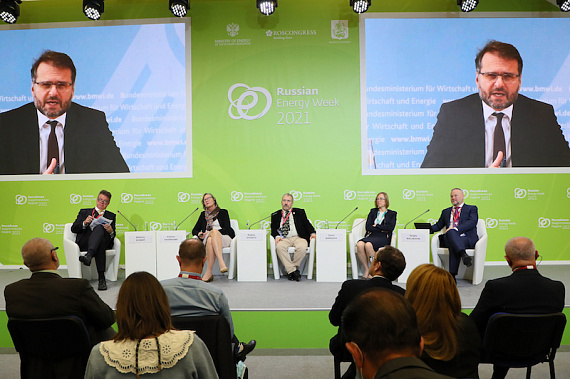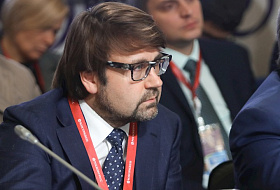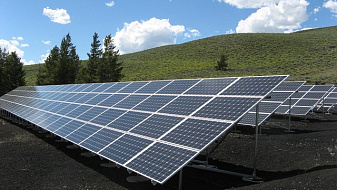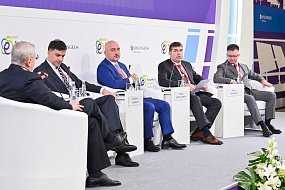Net Zero by 2050: New Opportunities for International Cooperation

KEY CONCLUSIONS
Carbon neutrality can only be achieved if all countries work together
“We are merely standing at the threshold of global changes and the formation of new transcontinental carbon regulation markets. I think that in the next 5–7 years it will be a market of collaboration rather than of competition. Only when the last fish or wild animal disappears from the face of the earth will we realize that we cannot eat money. That is why we must absolutely work together in this area,” Sergey Machekhin, Deputy General Director Project Engineering and International Cooperation, RusHydro.
“We more-or-less have a similar approach to how we’re going to move forward along this path. There is a wide field for cooperation between the Russian Federation and Germany. Of course, we will import energy, particularly from renewable sources. But in any case, it won’t be enough. That is why we will continue to work towards decarbonization across all areas. And the public supports us in this endeavour. We have worked with Russia in the past, and it is vital that we continue do so in the future,” Andreas Feicht, State Secretary, Federal Ministry for Economic Affairs and Energy, Federal Republic of Germany.
“The European Union is looking very carefully at whether imports contain carcinogens. We are not unique here – other countries are doing similar – but we are nevertheless the world’s biggest producer of phosphorus stock without cadmium contaminants. We conducted a survey of our investors here at PhosAgro. All of them were investing in line with the UN’s principles, i.e., in accordance with sustainable development principles. And these investors said that the main indicator they look at in terms of a company’s sustainability is the one that potentially illustrates how good their environmental management and social responsibility practices will be,” Alexander Sharabaika, Member of the Management Board, Deputy General Director for Finance and International Projects, PhosAgro.
PROBLEMS
A lack of a common global strategy to achieve carbon neutrality
“Each country has its own strategy for achieving these goals, but there is no single common strategy. The difference hinges on the answer to the question: what level are we going to attain? What level have various countries already attained? What strengths and weaknesses do countries have? What potential do they have?” Andreas Feicht, State Secretary, Federal Ministry for Economic Affairs and Energy, Federal Republic of Germany.
SOLUTIONS
Cutting carbon emissions and halting the use of carbon-based fuel
“Germany, for example, accounts for only 2% of total emissions. If you look at countries such as India and China, then the figures will be very different. That said, China will enact its programme to cut emissions from electric power production, and stop using carbon. I think that overall, all countries are moving in the same direction,” Kristina Haverkamp, Managing Director, German Energy Agency (dena).
“We are absolutely planning to reduce our carbon footprint. Our company’s investment programme sets out a global transition to gas generation instead of coal, and next year four out of our six facilities will move over to clean gas. We are building small power plants and developing small generation capacity. We launched two of these last year, are building two this year, and next year we will begin work on another three. We are very much looking at major partnerships with Russian and international companies to produce hydrogen as an alternative energy resource,” Sergey Machekhin, Deputy General Director Project Engineering and International Cooperation, RusHydro.
Bringing together all countries across the world to attain carbon neutrality
“It is vital for the Russian business community to think globally, and not just in terms of bilateral relations along the lines of ‘European Union–Russia’ or ‘Russia–China’. China is very rapidly moving towards international standards. Political decisions related to the development of the green economy are being implemented. This should largely make us view the planet as a whole, and not focus on a political tug of war between China and the European Union,” Evgeny Shvarts, Head, Center for Responsible Nature Management of the Institute of Geography of the Russian Academy of Sciences; Doctor of Geographical Sciences, Distinguished Ecologist of the Russian Federation.
“We are talking things over today, and an aspect of this discussion will likely lead to us identifying some shared goals, and a shared agenda. And the chances of reaching an agreement in a dialogue is always greater than if one country or region alone – regardless of the opinions of others – sets its own goals, figures, and so on,” Alexander Sharabaika, Member of the Management Board, Deputy General Director for Finance and International Projects, PhosAgro.
“We have forged ties between my ministry and the Ministry of Energy of the Russian Federation in order to accelerate some processes so that we will be fully prepared to face the challenges that await us. We have set out three main areas of cooperation – production efficiency, renewable energy, and of course, hydrogen,” Andreas Feicht, State Secretary, Federal Ministry for Economic Affairs and Energy, Federal Republic of Germany.
For more information, visit the Roscongress Foundation’s Information and Analytical System at roscongress.org/en.





